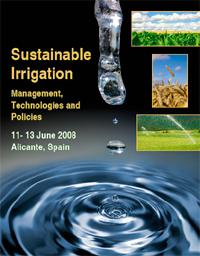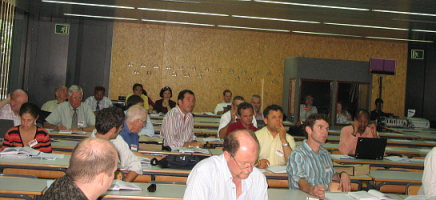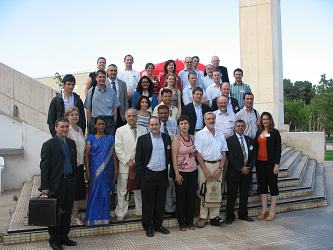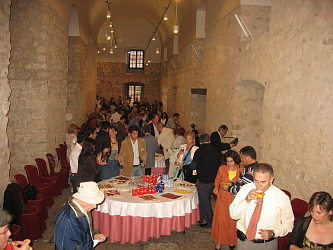Second International Conference on Sustainable Irrigation Management, Technologies and Policies
![]() 11 - 13 June 2008
11 - 13 June 2008
Alicante, Spain
Overview
 The 2nd International Conference on Sustainable Irrigation, Management, Technologies and Policies took place recently in Alicante, sponsored by the University of Alicante (UA) and the Wessex Institute of Technology (WIT), with the support of the Water Institute of UA and the Ministry of Education of Spain.
The 2nd International Conference on Sustainable Irrigation, Management, Technologies and Policies took place recently in Alicante, sponsored by the University of Alicante (UA) and the Wessex Institute of Technology (WIT), with the support of the Water Institute of UA and the Ministry of Education of Spain. The Conference Co-Chairmen were Professor Yolanda Villacampa of the Mathematical Modelling Systems Group of UA; Professor Carlos A Brebbia, Director of WIT; and Prof Daniel Prats Rico, Director of the Water Institute of UA.
The objective of the Conference was to discuss ways to achieve the most efficient and equitable use of water resources employed in irrigation, at the same time as ensuring their sustainability.
Over-exploitation of fresh water resources is leading to damaging long lasting environmental effects with considerable depletion of groundwater and surface water sources. The problem of contamination adds to these effects, effectively reducing the availability of clean water. The Conference also discussed how irrigation ought to be used to avoid deterioration of crops and soils.
The Conference was opened by Dr Daniel Prats Rico who stressed the importance of irrigation for the Alicante region, whose economy is dependent on the availability of sufficient water of the right quality.
Professor Carlos A Brebbia explained some of the development taking place at his Institute, particularly those of relevance to the topic of the Conference. The Institute has been actively involved in aquifer and surface water contamination studies, supported by the European Union framework programmes. They involve contamination by toxic chemicals and pharmaceutical products, and involve long term risk assessment. Project such as these are very representative of the way WIT works, ie linking different parties and contribution to knowledge dissemination at international level. Carlos stressed the desire of WIT to build strong links with other research organisations and hoped that the participants would consider visiting the Campus next time they are in the region.
The next presentation was the award of the Ted Hromadka Prize for Water Resources to the best paper presented at the Conference among those nominated. Two papers received a Diploma as distinguished presentations. They were:
“Designs for the future: the role of sustainable irrigation in Northern Australia”, by Jeff Camkin, CSIRO Land and Water, Australia
“Hydrological water balance modelling for assessing productivity and irrigation planning”, by Mahendra Nagdeve, Dr Panjabrao Deshmukh Agricultural University, India.
The Prize was awarded to Ned Norton from the National Institute of Water and Atmospheric Research of Australia or New Zealand, for his paper “Predicting environmental sustainability for proposed irrigation schemes”.

Special Sessions
The Conference started with three special sessions organised by Prof H. Bjornlund from Lethbridge University in Alberta, Canada and University of West Sydney in Australia. They were as follows:Part I Economic instruments: opportunities, limitations and governance
- “The role of economic instruments”, by H. Bjornlund
- “Sustainable irrigation and the role of economic instruments and their supporting institutions”, by K.W. Easter
- “Irrigation and water security: the role of economic instruments and governance”, by R.C. de Loë & H. Bjornlund
- “Application of economic instruments, tradable licenses and good governance for sustainable water conservation”, by W.L. Nieuwoudt, G.R. Backeberg
Part II Application of economic instruments – country perspectives
- “Irrigation to meet growing food demand with climate change, salinity and water trade”, by J. Connor, K. Schwabe & D. King
- “Factors influencing water allocation and entitlement prices in the Greater Goulburn area of Australia”, by S. Wheeler, H. Bjornlund, M. Shanahan & A. Zuo
- “Computer application for optimization of turn assignment on a tree-structured irrigation network”, by A. Alminana, L.F. Escudero, M. Landte, J.F. Monge, A. Rabasa and J. Sanchez-Soriano.
Part III Economic instruments special issues and future challenges
- “Water options contracts to facilitate intersectoral trade”, by J. Byrnes, L. Crase & B. Dollery
- “Irrigated agriculture in an era of high energy prices”, by K. Schoengold, T. Sproul & D. Zilberman
- “Sustainability of groundwater resources in India: challenges and scope for economic instruments and policy”, by S. Msangi.
Conference Sessions
Other sessions in the Conference included papers on the following topics:- Irrigation management
- Irrigation modelling
- Irrigation systems and planning
- Re-use of water
Visits and Social Activities
The Conference had a series of visits and social activities arranged by the local organisers.During the first evening, a buffet dinner was arranged in the Santa Barbara Castle, the famous historical monument that dominates the city and bay of Alicante. The Castle built at the time of the Moors’ domination of Spain is the symbol of the city. Conquered and improved by a series of Christian kings, it held the invaders at bay until it fell into disuse 100 years or so ago. Some of the old rooms now restored are witness to the importance of the Castle in the past. The clear night permitted a panoramic view of the town of Alicante, the bay and the whole region.
A buffet and cocktail evening offered by the University took place during the second day, when the participants were able to sample a number of local dishes, including the famous local rice dishes or ‘paella’ for which Alicante’s cuisine is justly renowned.
A special meeting took place under the Co-Chairmanship of Prof Henning Bjornlund and Carlos Brebbia to discuss the preparation of a state of the art book on “Sustainable Irrigation – Incentives and Instruments”. The invited would-be authors discussed the contents of the volume and its presentation. Carlos explained how the editorial process works once the book editor has finished preparing the manuscript for production, which includes editing and reviewing the different chapters. The book is expected to be ready in nine months’ time.
A field trip was arranged at the end of the Conference to Monforte del Cid to see some of the Irrigation Works in the region. The region is renowned for the cultivation of a winter grape that requires special care and careful irrigation.


Publication of Papers
The proceedings of Sustainable Irrigation Management, Technologies and Policies II, 400pp (ISBN: 1-84564-116-0) are available in hard back from WIT Press priced at £132/US$264/€198. Orders can be placed by telephone: +44 (0) 238 029 3223, fax: +44 (0) 238 029 2853, e-mail:
Papers from the conference will also be hosted online at the WIT eLibrary as volume 112 of WIT Transactions on Ecology and Environment (ISSN: 1743-3541). For more details visit the WIT eLibrary at: library.witpress.com


 Wessex Institute
Wessex Institute